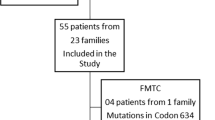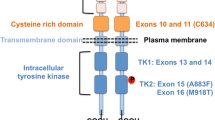Abstract
Several guidelines for patients with multiple endocrine neoplasia 2A (MEN2A) take into account genotype and family history of medullary thyroid carcinoma (MTC) disease aggressiveness. We sought to determine if an association exists independent of genotype, which could provide important information for counseling MEN2A patients in management of their MTC. Pedigrees of patients with ≥5 family members with MEN2A were retrospectively reviewed. Analysis was performed among kindreds with the most frequently observed codon mutation (RET 634). Familial MTC disease aggressiveness was evaluated using: (1) mean age at diagnosis of MTC, (2) current mean age of carriers without MTC, (3) proportion of kindred with MTC with metastatic disease at diagnosis, (4) proportion of kindred with MTC with metastasis/death from MTC as worst outcome, and (5) proportion of kindred with disease progression. 170 affected patients from 12 different MEN2A kindreds met inclusion criteria. The number of affected family members available for study per kindred ranged from 8 to 43 individuals. A difference in mean age of MTC diagnosis was found in screened patients (p = 0.01); mean age of MTC-free patients did not differ (p = 0.93). No differences were noted among kindreds in disease stage at presentation, worst outcome, or progression; marked variation in these measures was noted within families. In conclusion, a difference in age of MTC diagnosis among different RET 634 kindreds was identified. In contrast, notable intra-familial variability in disease aggressiveness was observed. Based on these findings, we recommend counseling patients with codon 634 mutations that their MTC disease course cannot be predicted by that of their relatives.







Similar content being viewed by others
References
Brandi ML, Gagel RF, Angeli A, Bilezikian JP, Beck-Peccoz P, Bordi C, Conte-Devolx B, Falchetti A, Gheri RG, Libroia A, Lips CJ, Lombardi G, Mannelli M, Pacini F, Ponder BA, Raue F, Skogseid B, Tamburrano RV, Thakker NW, Thompson NW, Tomassetti P, Tonelli F, Wells SA, Marx SJ (2001) Guidelines for diagnosis and therapy of MEN type 1 and type 2. J Clin Endocrinol Metab 86:5658–5671
Wells SA, Asa SL, Dralle H, Elisei R, Evans DB, Gagel RF, Lee N, Machens A, Moley JF, Pacini F, Raue F, Frank-Raue K, Robinson B, Rosenthal MS, Santoro M, Schlumberger M, Shah M, Waguespack SG (2015) Revised American Thyroid Association guidelines for the management of medullary thyroid carcinoma. Thyroid 25(6):1–44
Waguespack SG, Rich TA, Perrier ND, Jimenez C, Cote GJ (2011) Management of medullary thyroid carcinoma and MEN2 syndromes in childhood. Nat Rev Endocrinol 7:596–607
Baloch ZW, LiVolsi VA (2011) Prognostic factors in well-differentiated follicular-derived carcinoma and medullary thyroid carcinoma. Thyroid 11:637–645
Skinner MA (2003) Management of hereditary thyroid cancer in children. Surg Oncol 12:101–104
Yip L, Cote GJ, Shapiro SE, Ayers GD, Herzog CE, Sellin RV, Sherman SI, Gagel RF, Lee JE, Evans DB (2003) multiple endocrine neoplasia type 2: evaluation of the genotype–phenotype relationship. Arch Surg 138:409–416
Chen H, Sippel RS, O’Dorisio MS, Vinik AI, Lloyd RV, Pacak K (2010) The North American Neuroendocrine Tumor Society consensus guideline for the diagnosis and management of neuroendocrine tumors. Pancreas 39(6):775–783
National Comprehensive Cancer Network (2013) NCCN Clinical Practice Guidelines in Oncology: Thyroid Carcinoma 2013. https://www.nccn.org/professionals/physicians_gls/pdf/thyroid.pdf. Accessed 27 Oct 16
Giraudet A, Al Ghulzan A, Auperin A, Leboulleux S, Chehboun A, Traolen F et al (2008) Progression of medullary thyroid carcinoma: assessment with calcitonin and carcinoembryonic antigen doubling times. Eur J Endocrinol 158(2):239–246
Margraf RL, Crockett DK, Krautscheid P, Seamons R, Calderon FR, Wittwer CT, Mao R (2009) The multiple endocrine neoplasia type 2 RET proto-oncogene database: repository of MEN2-associated RET sequence variation and reference for genotype/phenotype correlations. Hum Mutat 30(4):548–556
Mole SE, Mulligan LM, Healey CS, Ponder BA, Tunnacliffe A (1993) Localisation of the gene for multiple endocrine neoplasia type 2A to a 480 kb region in chromosome band 10q11.2. Hum Mol Genet 2(3):247–252
Donis-Keller H, Dou S, Chi D et al (1993) Mutations in the RET proto-oncogene are associated with MEN 2A and FMTC. Hum Mol Genet 2(7):851–856
Tuttle RM, Haddad RI, Ball DW, Byrd D, Dickson P, Duh QY et al (2014) Thyroid Carcinoma, version 2.2014. J Natl Compr Cancer Netw 12(12):1671–1680
Kunz PL, Reidy-Lagunes D, Anthony LB, Bertino EM, Brendtro K et al (2013) Consensus guidelines for the management and treatment of neuroendocrine tumors. Pancreas 42:557–577
Thevenon J, Bourredjem A, Faivre L et al (2015) Unraveling the intrafamilial correlations and heritability of tumor types in MEN1: a Groupe d’etude des Tumeurs Endocrines Study. Eur J Endocrinol 173(6):819–826
Ariffin H, Hainaut P, Puzio-Kuter A et al (2014) Whole-genome sequencing analysis of phenotypic heterogeneity and anticipation in Li-Fraumeni cancer predisposition syndrome. PNAS 111(43):15497–15501
Acknowledgements
This project was possible due to the generous patients who have enrolled and continued to participate in the MD Anderson Cancer Center Genetics of Endocrine Neoplasia Registry. We would like to acknowledge Nicole Mohrbacher for her initial efforts in this work. Dr. Grubbs was supported by an American Cancer Society Mentored Research Scholar Grant for MEN2 (121138MRSGM1112901).
Author information
Authors and Affiliations
Corresponding author
Ethics declarations
Conflict of interest
The authors declare that they have no conflict of interest.
Rights and permissions
About this article
Cite this article
Long, K.L., Etzel, C., Rich, T. et al. All in the family? Analyzing the impact of family history in addition to genotype on medullary thyroid carcinoma aggressiveness in MEN2A patients. Familial Cancer 16, 283–289 (2017). https://doi.org/10.1007/s10689-016-9948-7
Published:
Issue Date:
DOI: https://doi.org/10.1007/s10689-016-9948-7




